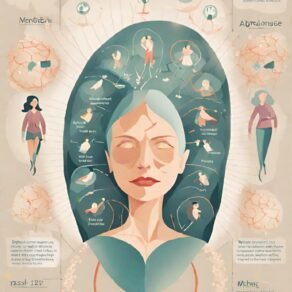Menopause, a natural biological process marking the end of a woman’s reproductive years, is a significant transition that every woman will experience in her lifetime. One common question that arises among women approaching this stage is, “menopause lasts how long ?” Understanding the duration of menopause involves delving into its various phases and the factors that influence its timeline.
1. Phases of Menopause:
Menopause is not a singular event but rather a process that unfolds over several years. It typically consists of three main phases:
Perimenopause: This phase marks the beginning of the menopausal transition and can last anywhere from a few months to several years. During perimenopause, hormone levels fluctuate, leading to irregular menstrual cycles and various symptoms such as hot flashes, night sweats, mood swings, and vaginal dryness.
Menopause: Menopause itself is officially diagnosed when a woman has not had a menstrual period for 12 consecutive months. This stage usually occurs around the age of 51 on average but can vary widely among individuals. menopause symptoms may continue during this phase, albeit often less intensely than during perimenopause.
Postmenopause: Postmenopause refers to the years following menopause. Symptoms such as hot flashes may diminish, but women are at increased risk of health issues like osteoporosis and heart disease due to declining estrogen levels. Postmenopause lasts for the remainder of a woman’s life.
2. Duration of Menopause:
The duration of menopause can vary greatly from woman to woman. While some women may experience a relatively short transition, others may find themselves navigating the symptoms of Perimenopause for several years before reaching menopause.
On average, Perimenopause lasts around four years, but it can begin as early as the mid-30s or as late as the early 50s. Menopause itself typically lasts for several years, with symptoms gradually tapering off over time. However, it’s essential to recognize that each woman’s experience is unique, and there is no set timeline for how long menopause will last.
Factors such as genetics, lifestyle, and overall health can influence the duration and severity of menopause symptoms. Women who smoke, have a family history of early menopause, or lead a sedentary lifestyle may experience a more prolonged transition.
3. Managing Menopause Symptoms:
Regardless of the duration of menopause, many women seek ways to manage its symptoms and improve their quality of life during this transition. Some strategies for managing menopause symptoms include:
- Adopting a healthy lifestyle, including regular exercise and a balanced diet rich in fruits, vegetables, and whole grains.
- Practicing stress-reduction techniques such as yoga, meditation, or deep breathing exercises.
- Seeking support from healthcare professionals, who can offer guidance and treatment options tailored to individual needs.
- Considering hormone replacement therapy (HRT) under the supervision of a qualified healthcare provider to alleviate severe symptoms like hot flashes and vaginal dryness.
Conclusion:
Menopause is a natural and inevitable phase of a woman’s life, marked by hormonal changes and various physical and emotional symptoms. While the duration of menopause can vary widely among women, understanding its phases and seeking appropriate support can help women navigate this transition with greater ease and confidence. By adopting healthy lifestyle habits and exploring effective symptom management strategies, women can embrace this new chapter of life with resilience and grace.menopause lasts how long





